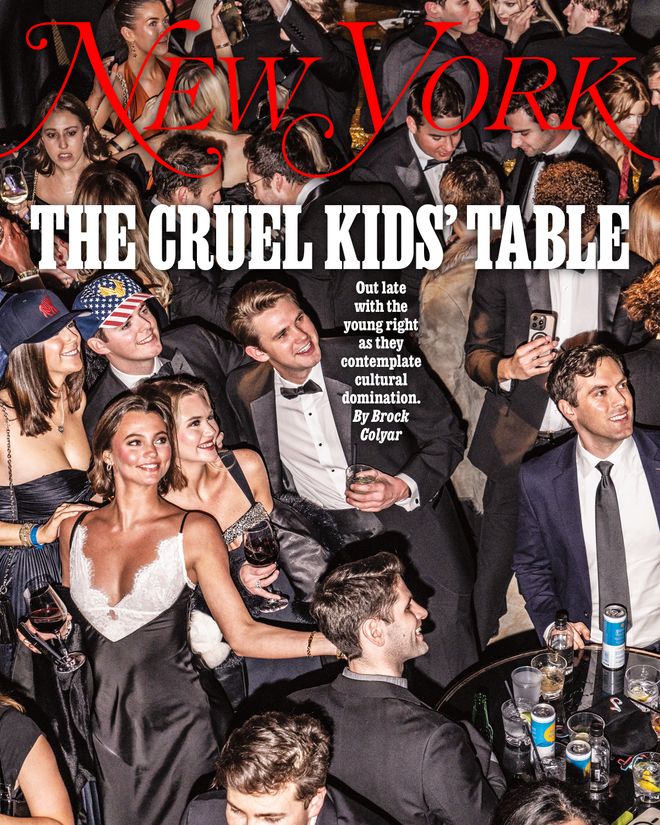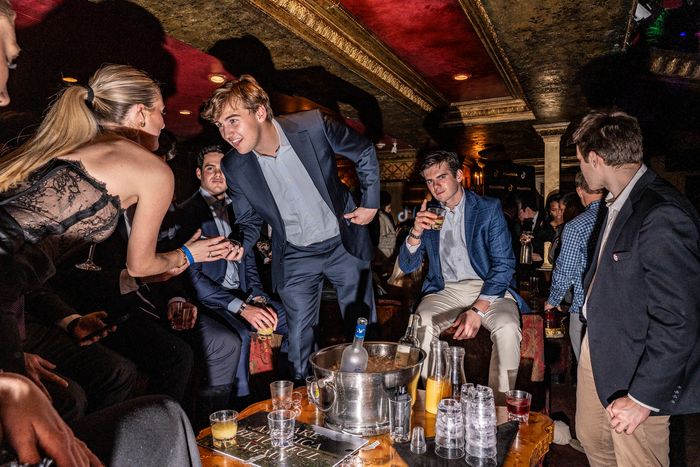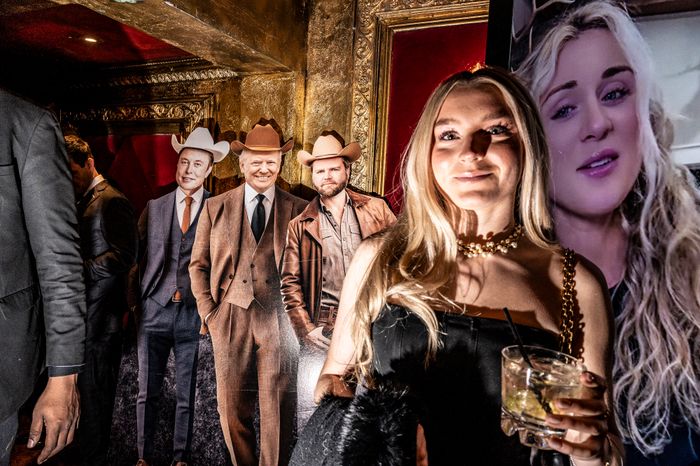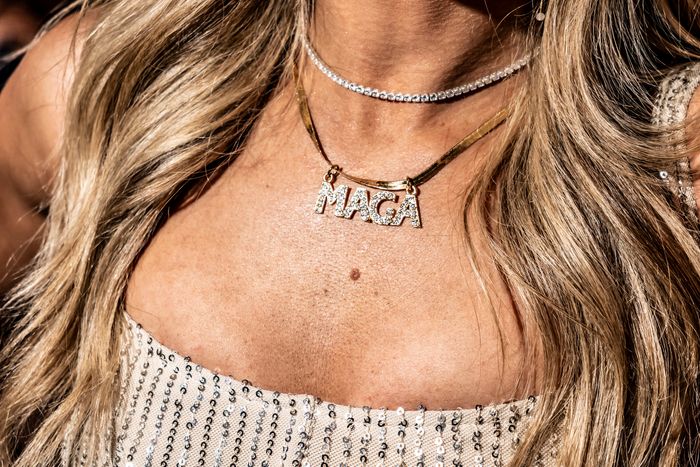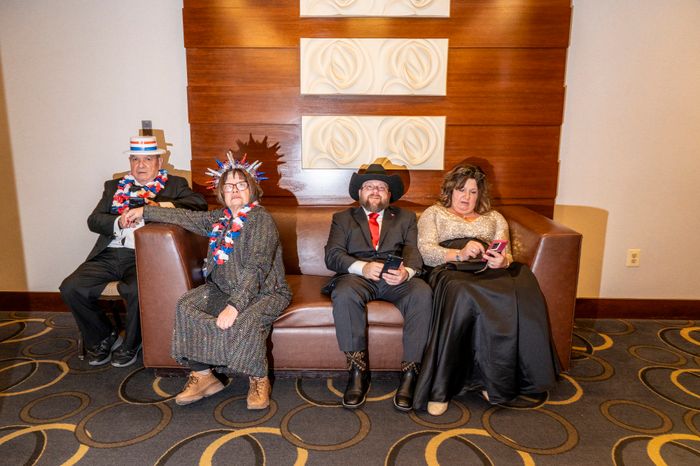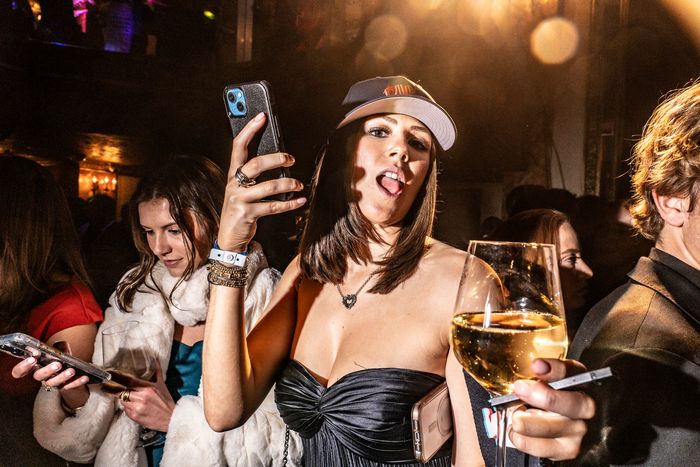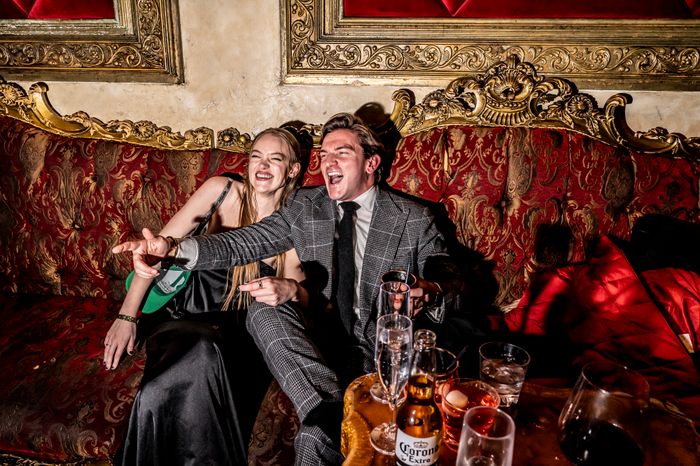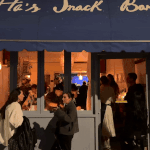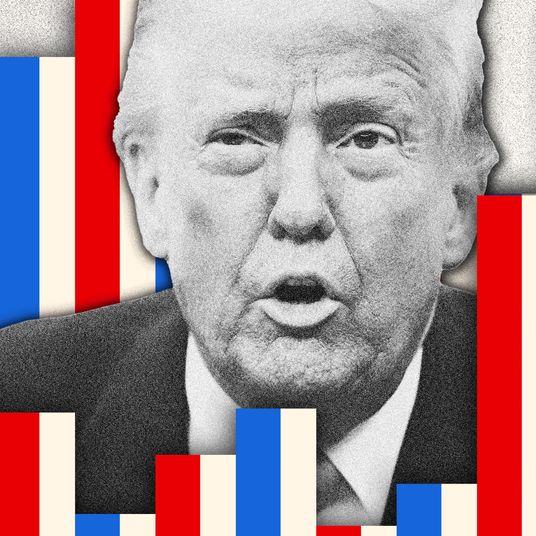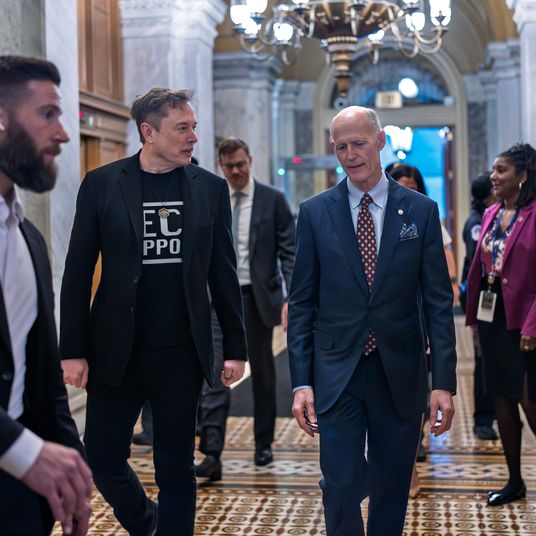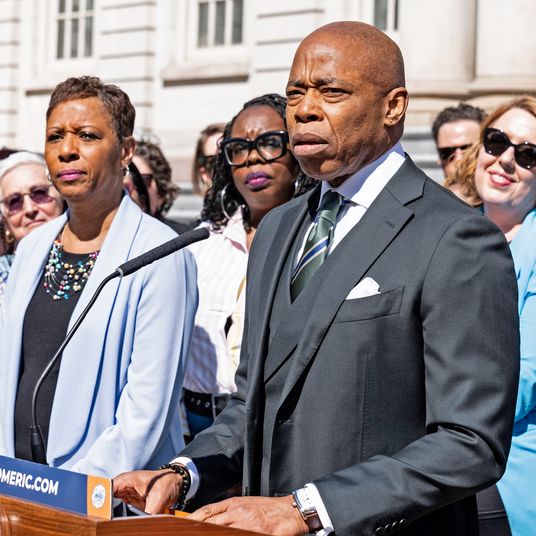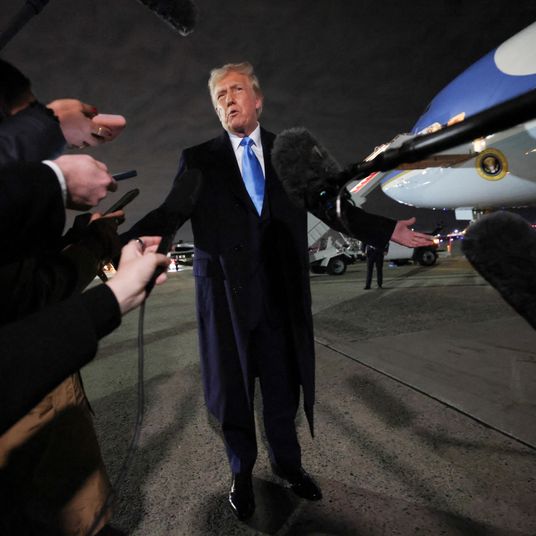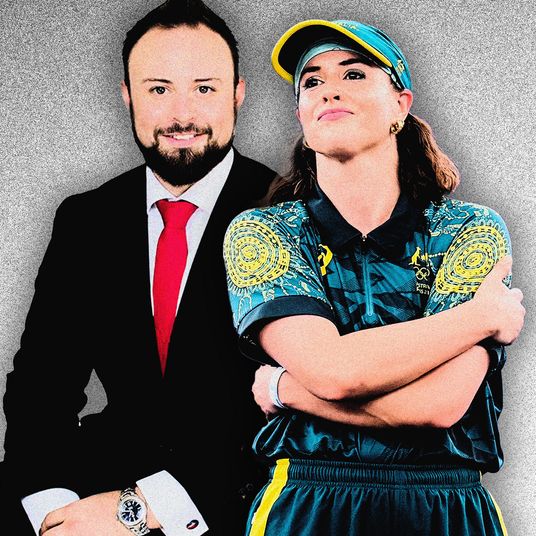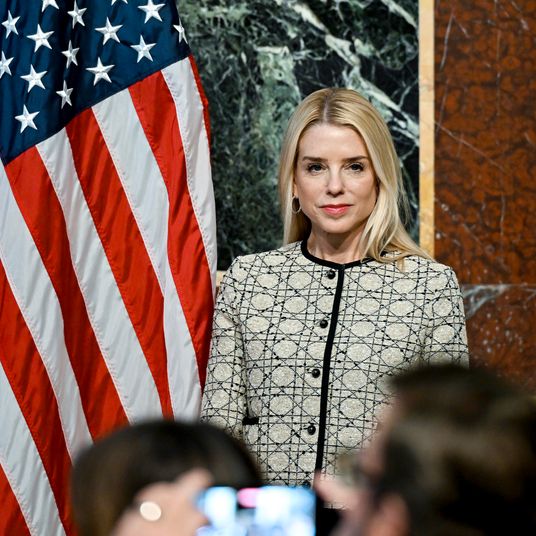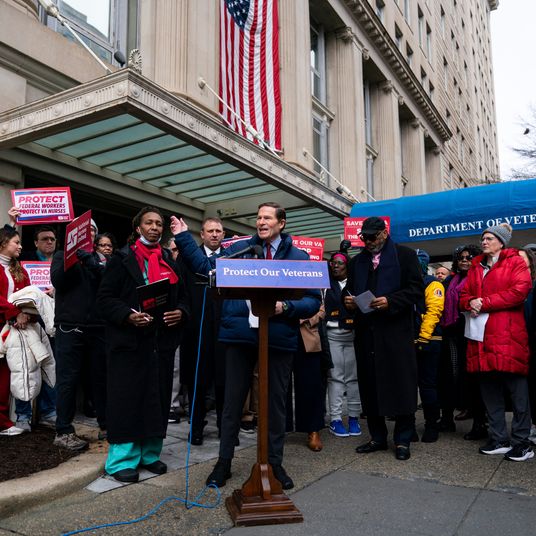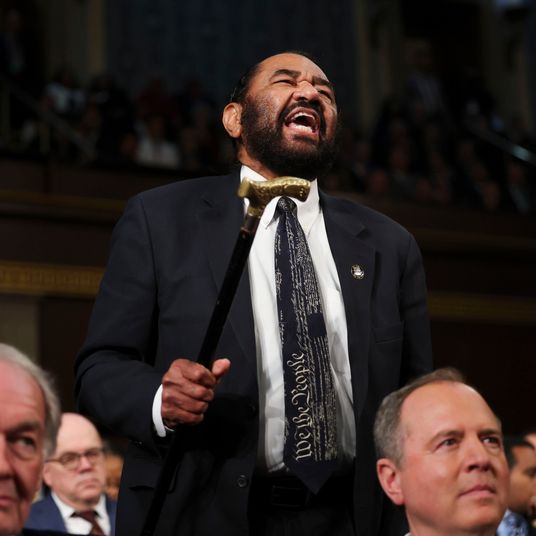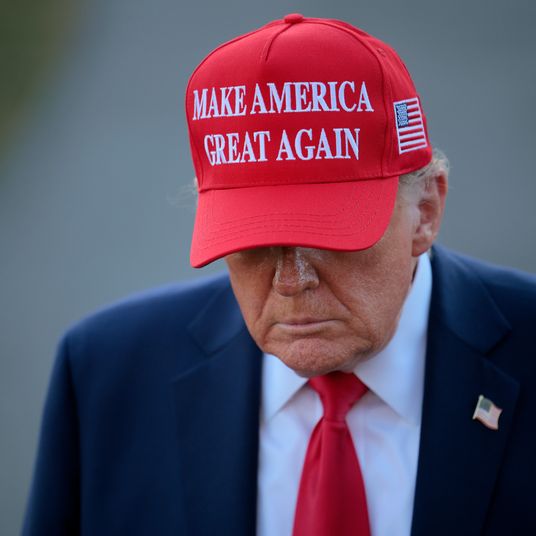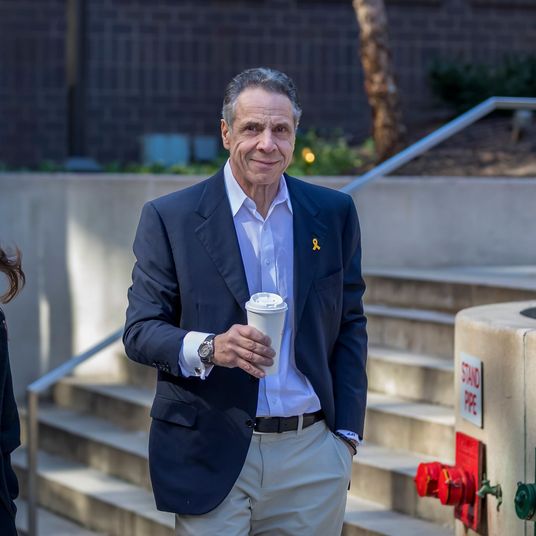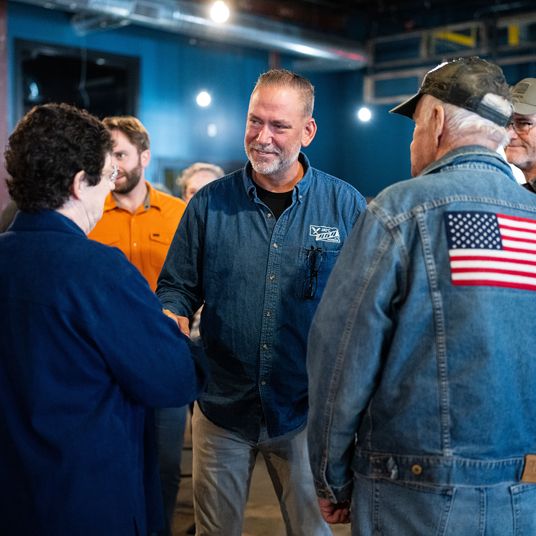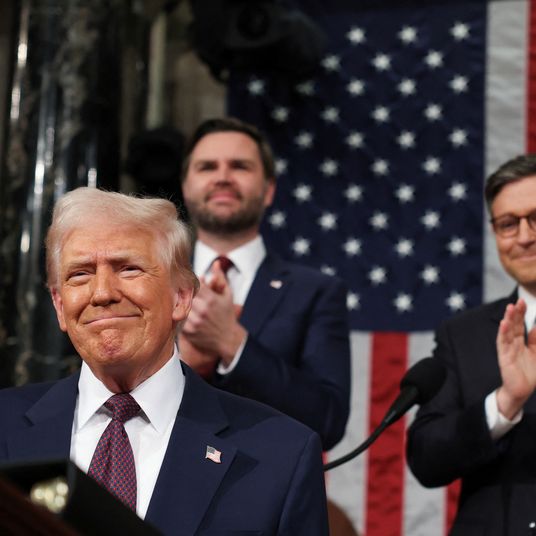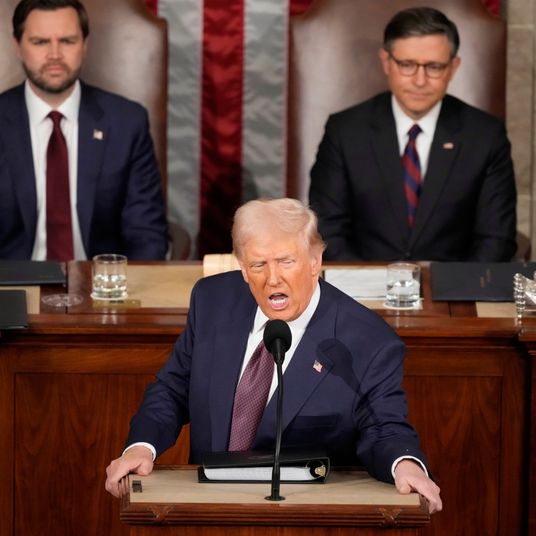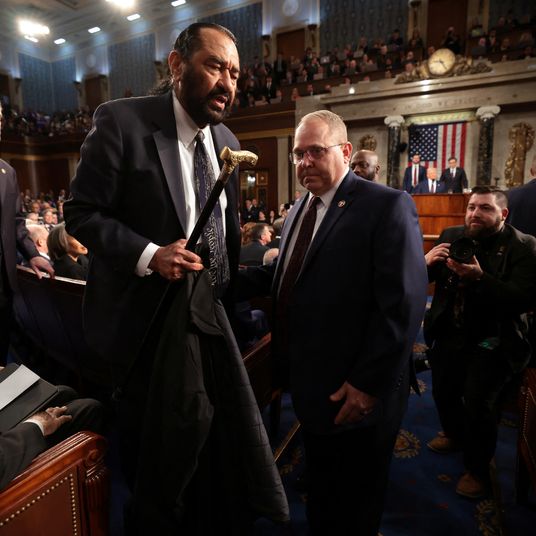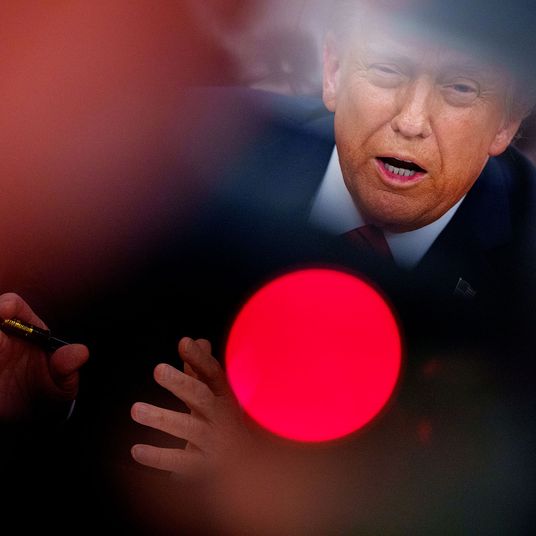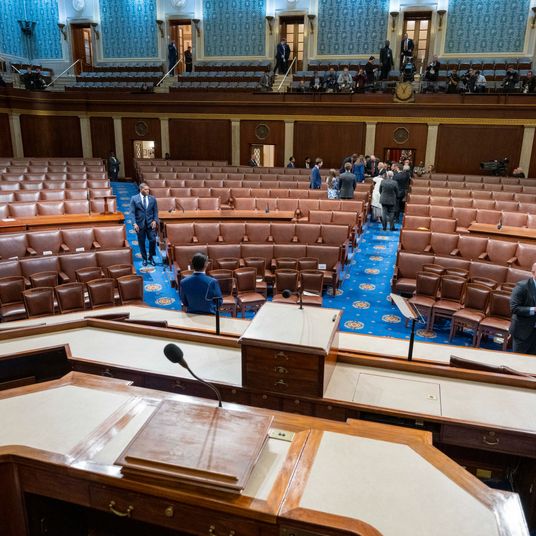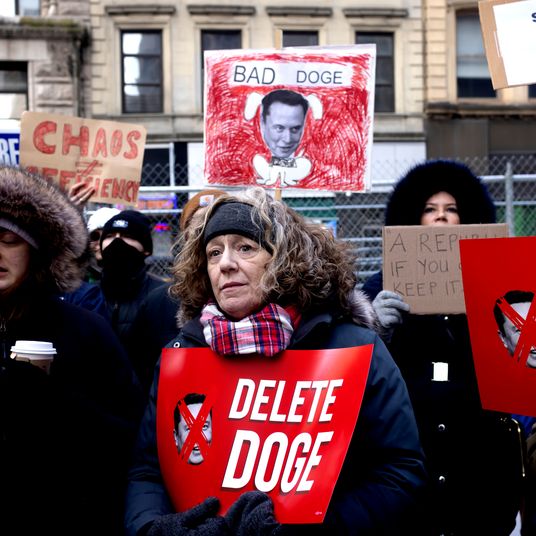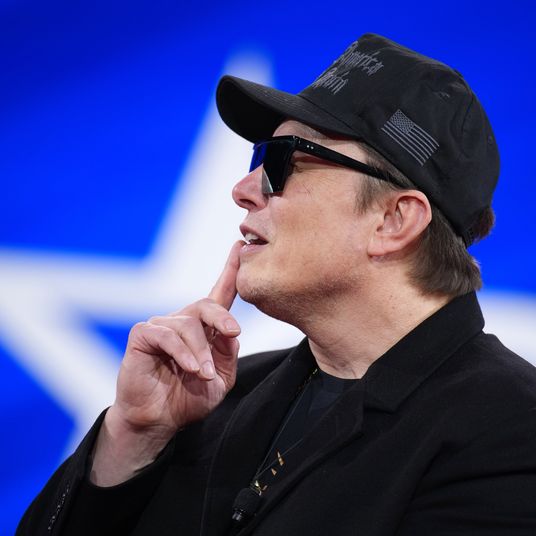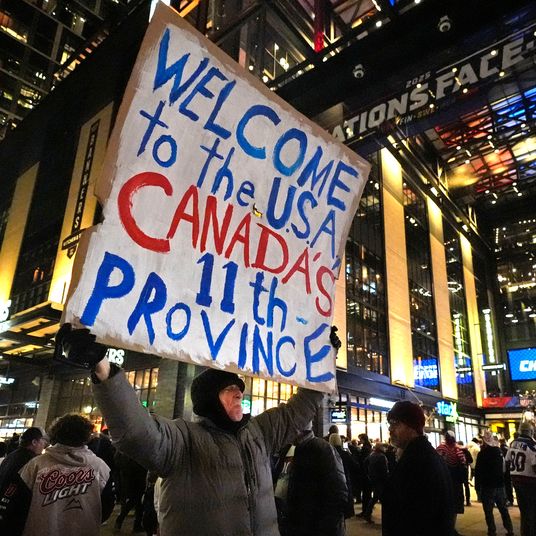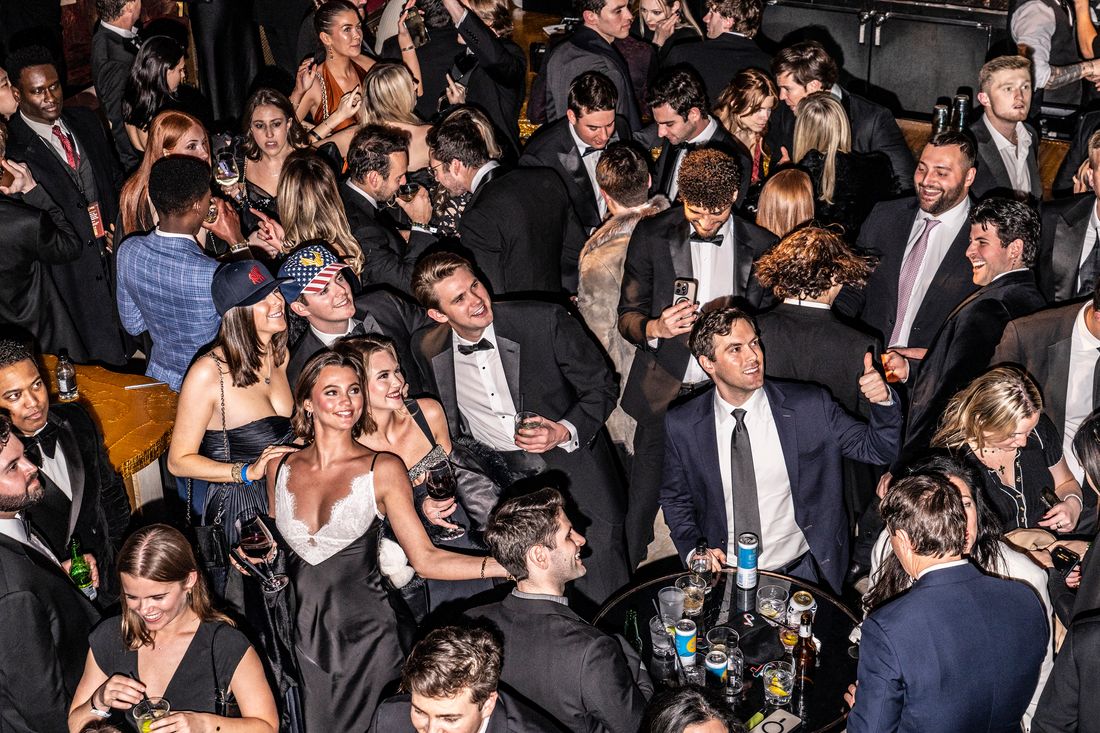
This article was featured in One Great Story, New York’s reading recommendation newsletter. Sign up here to get it nightly.
It’s Monday, January 20, the first night of Donald Trump’s second presidency, and just a couple blocks from the Capitol Building that his now-pardoned MAGA army swarmed four years and 14 days ago, there is, as there has been for the past several nights in restaurants, hotel ballrooms, and lobbying offices, a party for people who have never been happier about the direction in which this country is heading. They are drinking, smoking, flirting, networking, but mostly congratulating one another on their big win.
This party is at Butterworth’s, a new dimly lit bistro that has become a hot spot for the right in part because one of its investors is Raheem Kassam, once the editor-in-chief of the U.K. edition of Breitbart. On the menu are themed cocktails with names like American Carnage and the Second Term. In the middle of the room, in a hip-hugging emerald ball gown and a hefty string of pearls, is Tanya Posobiec, the wife of Jack Posobiec, a far-right activist and onetime Pizzagate pusher. She has just arrived from one of the president’s three official inaugural balls and is telling me about how splendid her night has been. She even met Mike Tyson and Conor McGregor. She’s surprised, she admits, that despite the horrible traffic, the below-freezing weather, and the general pandemonium, it’s been a no-drama weekend. “I haven’t heard anyone complain,” she says, almost shrieking with glee. “It’s such a positive vibe.”
In This Issue
Outside on the sidewalk, two tuxedoed men smoking Marlboros are trying to remember what exactly the president said that morning. Are we entering a New Dawn? A New Era? Wait, was it Golden Era? Golden Dawn? They erupt into laughter. “It’s a little bit Hitlerian,” one concludes.
For the first time in several administrations — the last inauguration, of course, was marred by the pandemic and an insurrection, though nobody here would call it that, and the one before that was surrounded by unfriendly protests — this long weekend has been an unfettered celebration. No resistance in sight. Everywhere, across the capital, people are comparing invitations and wondering, How did that person get into that party? and, as usually follows that question, Why wasn’t I invited? As one 28-year-old conservative influencer, Xaviaer DuRousseau, tells me, “It’s Republican Coachella, and Donald Trump is our Beyoncé.” (He kept his weekend organized on a color-coded spreadsheet in intervals of 30 minutes.)
Like at a music festival, everyone’s arms were covered in wrist bands. “Have you ever been to Comic-Con?” a Brit named James Layfield, who is out promoting his AI software that benefits Elon Musk’s Department of Government Efficiency, asks me outside Butterworth’s. “There’s a lot of love here.” Over the weekend, Curtis Yarvin stopped by. As Morning Consult reported, Republican optimism is the highest it’s been since November 2020. The fans and supporters are talking of “love” and “hope” and “unity.” It feels like this set’s 2008, insofar as people are literally crying and dancing in the streets, usually to the president’s song of choice, “Y.M.C.A.”
It’s easy to see the festivities as an obnoxious victory lap of the MAGA coalition, and of course they are. Conservatism — as a cultural force, not just a political condition — is back in a real way for the first time since the 1980s. But here in D.C., among the tourists from Tampa, the donors, and the last politicians Trump whipped into submission, one can also witness the emerging influence of a newer type of conservative. They are not disenfranchised or working class or anti-elite or many of the other adjectives used to describe Trump supporters since 2016. Rather, they are young, imposingly well connected, urban, and very online. They are rebels once again storming Capitol Hill, though without the pathetic scariness of the January 6 rioters.
They are crypto nerds and influencer girlies and recent MAHA converts and gays of all stripes, plus your standard-fare Rogan-listening bros. Few of them would call themselves Republican, lest they be tarred RINO. They refer to their political affiliation, almost always, as the “movement.” Some are the black sheep at their own family Thanksgivings, yet they project confidence that they’re the relevant ones now. Many are hot enough to be extras in the upcoming American Psycho remake.
This set’s most visible political stance is a reaction to what it sees as the left’s puritanical obsessions with policing language and talking about identity. A joke about Puerto Ricans or eugenics or sleeping with Nick Fuentes could throw a pack of smokers outside Butterworth’s into a gigglefest. Recounting her time at one of the balls, a woman tells me she jumped the velvet rope into a VIP section “like a little Mexican.” Then she lets out a cackle. This is the posture that has attracted newcomers to the cause. “Six months into Biden being president, I was like, I can’t fucking do this anymore,” says a 19-year-old New Yorker who once quite literally had blue hair and attends Marymount Manhattan, which he describes as “75 percent women and 23 percent trannies.” He had supported Biden, but “I hate watching the things I say. I took a much farther horseshoe around this time.” Later, a former Bernie supporter (who looked like the most Bernie-supporting person one could imagine with long, curly hair and a plaid shirt) told me the same: He wanted the freedom to say “faggot” and “retarded.”
“Conservatives used to be uptight, but the left has become the funless, sexless party. Not that the right is the party of sex, necessarily. We have fun,” says a 31-year-old influencer, Arynne Wexler. “What does a conservative even look like anymore?”
Even up until the election, many liberals who still thought of themselves as the owners of mainstream culture dismissed this scene as fringe. And it is unclear who is seriously serious about their beliefs and who is a grifter doing it for the bit. But a massive cultural realignment is taking place, and now this set of shitposters is in the same league as an entirely new Establishment, which includes not only the tech overlords (Mark Zuckerberg, Elon Musk, Jeff Bezos) but also a growing number of celebrities (Carrie Underwood, the VillagePeople, Snoop Dogg, and Jewel). Kim Kardashian is posting photos of the First Lady. Even Spotify hosted an inauguration brunch. (Meanwhile, all the progressive institutions — Hollywood, college campuses, the mainstream media — feel like they’re collapsing simultaneously.) “We were the underdogs for so long. Now every last foe is a friend,” Wexler tells me. “Trump winning is the first step of the real work we have to do. It’ll culturally trickle down.”
The night before the inauguration, the event to be at if you were under the age of 30 and very online was the Power 30 Awards, designed to honor the influencers who most successfully shilled for Trump this election. It was around the corner from the White House at Sax, a burlesque-y nightclub and lounge decorated with red velvet and gilt — sort of a cheaper Mar-a-Lago. The hostess of the hour was Raquel Debono from Make America Hot Again, a singles meetup in New York. (She identifies as a “city conservative”: “You can be a normal person who likes to party and go out and vote conservative.”) The corporate sponsor of the evening was, notably, TikTok.
Just that morning, the app had been banned in the U.S., only to come roaring back later in the day with a message of support for the incoming president, leaving young progressives in a state of befuddled mourning over what had happened to their beloved platform. Meanwhile, their counterparts on the right were ordering Casamigos bottle service and posing for pictures with life-size cardboard cutouts of Trump, J.D. Vance, and Musk, all of them wearing cowboy hats. A banner on the wall read, 74 MILLION FOLLOWERS, 33 BILLION VIEWS, ONE COMMON CAUSE: MAGA.
“There would be no celebration tonight if it weren’t for the commitment of our keyboard warriors,” Alex Bruesewitz, who advised Trump on his social-media strategy, announced to the room. The honorees represented a hodgepodge of special interests. The list featured long-familiar pundits, including Ben Shapiro, as well as people nobody had heard of even three years ago, such as Riley Gaines Barker, a 24-year-old former college swimmer whose sole issue is fighting trans people in women’s sports. Bryce Hall, the 25-year-old boxer with 23 million TikTok followers who once dated Addison Rae, was at the bar, downing shot after shot of tequila. He wondered how many would be too many in the case that, as he had been told might be possible, he got a few minutes with Trump later in the night. Former short-lived U.K. prime minister Liz Truss was also there, rumored to be scouting talent for a Daily Wire–inspired media company, and so was Jessica Reed Kraus of House Inhabit. A bearded ginger somewhat rudely snapped a photo of the journalist Taylor Lorenz, a sort of frenemy to this crowd. (“I like the music,” she told me when an Icona Pop song came on.)
The gathering was evidence that the youngest, most online members of Trump’s party have acquired his knack for turning the culture wars into something as entertaining as reality TV. Attention is power. One honoree of the night was DuRousseau, whose TikTok is full of sometimes transphobic rants for a target audience he describes as “Beverly Hills conservatives.” “When you look back, this was the first influencer election,” he said. “There’s a whole new industry of media personalities coming together to fight for our side of the aisle.” At least one TikTok employee who works in the “policy” department was there; asked about changes to the app’s guidelines in recent months, he told me cheerfully, “We’re letting a lot more stuff through. A lot.”
This was the media ecosystem that flourished under the noses of the Democrats while they busied themselves trying to court Taylor Swift and Beyoncé. “MAGA is MTV for Gen Z. This isn’t the fringe. This is youth pop culture. I’ve been saying this for years,” said Mitchell Jackson, a publicist and crisis consultant who works with conservative podcasters. “Meanwhile, Democrats sound like ’80s Republicans protesting rap songs.” Sure, Kamala Harris had become a meme, too. But she was “brat,” and could anyone above the age of 30 actually define what exactly it had to do with her candidacy? The most prominent political TikToker Democrats had in their camp was a 22-year-old boyish NYU student named Harry Sisson, who insisted, even after the first debate, that Joe Biden was a completely viable candidate. Sisson had been name-checked by one of the Power 30 organizers in a post about the party: “Bryce Hall and Riley Gaines. Two people who can beat up Harry Sisson.” (It’s worth mentioning Trump, among his accounts, had 4 million more followers than Harris.)
The room also made all too clear just how big the party’s tent had become. Posters around the room read CONSERVATION IS CONSERVATIVE, over an image of Trump riding a buffalo. “It’s finally popping off,” a beefcake lawyer who represents Jewish students suing their university over pro-Palestine protests screamed at me when a song he liked came on. A frat boy from Georgetown, lording over a table, told me he’s here because he’s Catholic. “I really don’t like abortion. I hate abortion,” he said. At the bar was the DJ 3LAU, in town to spin at Trump’s ball. “I voted for Big D because of crypto, free speech, and the Constitution,” he said.
Some members of this crowd would admit to what they see as this coalition’s unsavory parts (say, how creepy the men can be) but refuse to do so on the record. Best not to cannibalize, they agreed, when the going is good. “The silent majority is coming out. Because Trump won!” another influencer, a Pennsylvanian in a sleek black dress named Joy Backlas-Cruz, told me. She voted for Biden in 2020 and is a recent convert to the cause. As she told it, she got so depressed during the pandemic she turned to YouTube, where she found Jordan Peterson’s daughter, Mikhaila Fuller. Fuller’s dietary advice, she claimed, got rid of her brain fog; eventually, Backlas-Cruz dropped out of medical school. She’s not comfortable with Trump’s H-1B-visa policies — her mother and many of her friends are from India, she said — or some Republican LGBTQ+ policies (she once dated a woman), but she agreed with a lot of Elon’s positions and, well, she’s fine with it all holistically.
After a few hours of club classics, like Kesha’s “Tik Tok,” Waka Flocka Flame performed, and McDonald’s was served. Despite the MAHA-ers around the room, the crowd ate the burgers up and took good advantage of the liquor, too. By then, the club had gotten predictably messy, and not entirely in a bad way.
You don’t have to be Nashville–cowboy boots–country music. You don’t have to churn your own butter on a homestead,” Arynne Wexler, the influencer, told me before the weekend began. “You can be urban, live in a condo, go to Casa Cipriani, and still be normal and vote for Donald Trump.”
From an aesthetic standpoint, this new class of conservatives is willing to top off a perfectly stylish outfit with a MAGA hat, which now comes in lots of colors: red, yes, but also yellow, green, orange, or black, the “dark MAGA” kind that Elon Musk wears. Almost everyone is white. The men look like Pete Hegseth, in bow ties and black suits, with clean-shaven faces. The women are almost all out of their league. As I was once informed, “These young conservative parties are 80 percent men and 20 percent the most beautiful women you’ve ever seen.” Their makeup is subtle, their hair only gently blown out, their faces not noticeably Botoxed; all in all, they are less yassified than the older women in their party — say, Kimberly Guilfoyle. In this house, Melania is Mother.
“I serve looks every time I go somewhere. I get burnt at the stake if I repeat an outfit,” Xaviaer DuRousseau told me. At the Power 30 Awards, he wore a sparkling blazer and a bow tie. “No one here knew what Loro Piana was eight years ago,” Wexler added. It was all somewhat reminiscent of what the trend forecaster Sean Monahan has called the “boom-boom aesthetic,” a throwback to ’80s glam that includes golden, lamplit interiors (like that at Butterworth’s); “supervillain vibes”; and sexy cars. A 20-year-old conservative, who refused to speak to me in part because I’m not “normal gay,” did let me in on the fact that he had rented a red Lamborghini for his weekend in the capital.
It is entirely possible, in this world, to be very gay. Everywhere I went, people were fangirling over Scott Presler, an out gay activist with Jonathan Van Ness’s hair. He credits himself with turning out the Amish vote enough to win Pennsylvania (he was also, in 2020, a “Stop the Steal” organizer). “Scott is the best. He’s the best. He won us Pennsylvania. I really like him,” said the frat boy from Georgetown, who told me homosexuality was a sin. (What’s his biggest sin? “Adultery,” he responded, a bit too quickly.)
When I asked Charles Moran, the president of the gay Log Cabin Republicans, why the group wasn’t throwing a ball this year, he told me, “Because there are too many other parties with better scenes. We’ve been included to the point where we don’t need to have our own tables; we’ve been invited to everybody else’s.” A trip to the Log Cabin’s headquarters, a townhouse that members call Gay Gardens, revealed how many packages a gay Republican can now come in. Passing one of the hairy beer-drinking (Coors, not Bud Light) cowboys on the street, I would never have guessed his sexuality had he not opened his mouth and said something about Grindr. The house was decorated, for some reason, with pictures of Frida Kahlo, and on the wall hung a framed Pride flag, which the plaque claimed was the first to fly at a Republican National Convention. In the same way the young left, at a dinner party, might say, “Where were you when Donald Trump was elected?” here people ask, “Where were you when Donald Trump was in Butler?” (One New York Young Republican told me he’d been masturbating.)
Meanwhile, just a few minutes away, a more familiar scene of MAGA commoners was unfolding at the All American Inaugural Ball. Hosted in the dusty, carpeted basement of a Hyatt Regency, this gathering had drawn the crowd of Trump supporters who still get their news from Facebook, who had traveled a long way and paid a lot of money to get to the inauguration. Admission was $850 per ticket on Eventbrite. Here, there was sequined American-flag garb, goatees, and selfie sticks. “I’m on the Trump train!” a hairdresser from Florida squealed to me. “Chugga-chugga choo-choo!”
Inexplicably, the room smelled like corn. “Sexual Healing” was playing. “Have you noticed the entire room is white?” an older woman in an updo and a silver sequined gown asked me, though it wasn’t entirely clear whether she thought that was a good thing or a bad thing. The Laken Riley Act was a popular topic of conversation.
Guests spent more time at the buffet (which served “Middle Eastern Rice”) than the merch stand, where there was a $10,000 bronze FIGHT FIGHT FIGHT sculpture, depicting the president with his fist in the air shortly after getting shot, supposedly signed by him. When Sean Spicer hopped onto the main stage, he growled, “You guys fired up or what?” before reminding everyone to visit godblesstheusabible.com and introducing Lee Greenwood to croon “God Bless the U.S.A.” Cue the crocodile tears.
Inside the men’s room, the men were hee-hawing about how grateful they are they can piss in a urinal and not wait in the women’s line.
“If you change your fucking pronoun, you can go anywhere you want!”
“Are you identifying tonight, man?”
In rooms like this one, full of the tanned and tired, it’s tempting to hope that the president’s cult of personality could one day go extinct, that this is the last cruise out of Mar-a-Lago. I later asked Wexler what she makes of her less fabulous bedfellows. “It’s tacky. We need to be better,” she said. “That’s why I put my face in my videos. People need to see that I look like a liberal! I look like a girl that would, ugh,” she says, sticking her tongue out, “vote for Kamala.” At the parties she frequents, there are Trump cutouts for selfies, but nobody would shell out for a Trump Bible. It seemed important, though it’s mostly unacknowledged, that the new conservatives not treat Trump too messianically, because what comes after him? They were more likely to talk about the culture-war issues he espouses than the man himself — perhaps because he’s their means to an end.
A few hours after Trump’s inauguration, I went to meet Wexler at her friend’s $4 million Arlington penthouse, decorated with American-flag art and a towering statue of an elephant, all overlooking the cemetery. A few other young women with long eyelashes and tall stilettos were sipping mimosas and getting IV drips from a hunky doctor, an attempt to rehydrate themselves after staying out late the night before. On a couch nearby was an assortment of bros watching Fox News on a flat-screen and occasionally letting out a little whoop as if they were watching football.
“I’m so fucking tired,” Wexler squawked when I got there, and she started on her saline drip. “I sound like a half-tard. I’m not full retard right now.”
Until last January, Wexler was working at a tech start-up and only had 4,000 followers on Instagram. A Wharton graduate, she lived in New York and recently fled to Miami for “political reasons” (among other things, masking culture at Trader Joe’s). One year ago, she started an Instagram account with the handle @nonlibtake, where she posts about everything from Project 2025 to how “America has been a low T soy beta cuck loser for years,” or why she believes “pretty girls are usually only friends with other pretty girls” (“Ugly girls don’t know how to be friends with a pretty girl”). Today, Wexler has 264,000 followers, including Joe Rogan, Donald Trump Jr., and Dana White, who she says once invited her to a UFC fight. Late last year, while lunching at Mar-a-Lago, she says, one of Trump’s handlers recognized her and let her tell the president a joke: “What’s the difference between a liberal Jew and Donald Trump? One has Jewish grandchildren.” (Wexler is Jewish.) She also says she knows Matt Gaetz: “He’s truly one of the smartest people I’ve ever met, and his humor is a reflection of that intelligence.”
Another young woman hanging out at the penthouse, Caitlin Sinclair, dragged her IV bag over to gossip. “This has been so emotional. Today I ugly cried, like a baby,” Sinclair said. “I could count how many times I’ve happy cried in my life on one hand.” Then they take a brief moment to compliment each other’s content skills.
Wexler thinks her account can get young women to “come out” of their MAGA closets because, ideally, in her they see themselves. “We all serve different purposes. I really believe culture is upstream of politics,” Wexler told me. “It’s okay to have your values. A lot of people feel this way; they’re just too shy to say anything.”
All weekend, everyone in this set kept referring to themselves as “normal.” In their eyes, they are representative of the rest of the country — if not how they look, exactly, then how they talk. After all, the mainstream media had nearly declared a Harris victory after a comedian at Trump’s Madison Square Garden rally made racist jokes about Puerto Ricans, only for Trump to set a GOP record with Latino voters. Raquel Debono, when trying to explain why she likes to tell fat jokes, told me, “I’m normal, okay? Probably the most fucking normal person here.” Even her “lib” friends, she says, enjoy a not-so-PC joke every now and then, but only behind closed doors. “I want to be skinny! You said the same thing last night, bitch! You had bulimia ten years ago!” Another example of the kind of thing she believes everyone else is thinking, too, but may be too shy to say: “The DEI bullshit? Who the fuck cares?”
Off-duty from TikTok and their Fox News guest-panelist gigs, the young conservatives did exhibit a certain level of willingness to really get into it in a mostly productive way, which, I’ll admit, is more than I can say about a lot of people back in Brooklyn. Still, it was disconcerting how often a normal conversation with one of these so-called normal people could cannonball from politics and policy into, at the very least, a not-so-PC joke and, at worst, something hateful.
When I first reached out to Wexler, for example, asking to talk about her weekend plans for the inauguration, she wrote back, “Let’s do it. Full transparency, I think ‘pronouns’ are ‘retarded.’” She asked me to tell my readers that. “Tomorrow, we’re going to have images of them rounding up illegals and deporting them. That’s exciting,” she said another time, cackling. She also called me a “man in lipstick,” though I wasn’t wearing any. Later, when introducing me to Sinclair, she said, “He’s a queer. But a friendly one.” I laughed.
“The hold the left has is coming to an end because you guys were making bad decisions,” a droll, self-confident IDF soldier tells me at Butterworth’s. “When you go too far, you isolate people, you polarize people. The pendulum effect is real.” Here, she says, “is where you can say whatever you want!”
It’s true that over the past few months since Trump was reelected, I had begun to feel these young conservatives’ influence seeping into my own polite circles like The Substance. We no longer had any patience for the identity warriors on our timelines. A friend and I started swapping clips of Megyn Kelly on Instagram; we thought they were hilarious. (Our favorite was her take on the fires in L.A.: “The last thing I want to see if I’m in a burning building is (a) a woman and (b) an obese woman.”) I was unleashed: the R-word, fat jokes. No one, not even the bleeding hearts I know, ever seemed to get all that offended — the only time I lost friends in the past year for political reasons was debating the war in Gaza — and mostly, even if they wouldn’t say it themselves, they chuckled. “OMG you’re tacky for that one,” one would text me back, in those moments. It felt freeing, empowering, though perhaps in the same way that bullying someone does when you’re in middle school.
On my last night, I got to smoking with a model type in a fur coat with a vaguely European accent. I’d later discover she’s married to an alt-right activist with ties to white nationalists. “How can one country be so entertaining? Americans are just made of something different,” she said to me. “Everything became so puritanical.”
I nodded my head in agreement. The next morning, I woke up sick.



